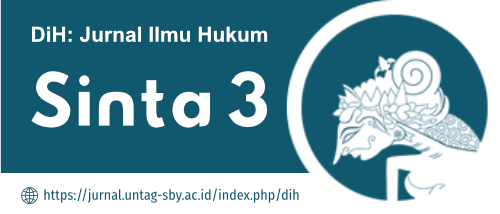KAJIAN YURIDIS TENTANG KEBERADAAN PERGURUAN TINGGI NEGERI BADAN HUKUM MILIK NEGARA DALAM UNDANG-UNDANG SISTEM PENDIDIKAN NASIONAL
DOI:
https://doi.org/10.30996/dih.v7i13.252Abstract
This research aims to analyze and expose how the position of the College of law in Agency-owned Country laws and regulations in these rights are examined from the legislation of the national education system. It also seeks to analyze and expose the juridical effects of the verdict of the Constitutional Court No. 11-14-21-126-136/PUU-VII/2009 against Universities State-owned legal entity. Establishment of universities in the form of a State-owned legal entity is as an attempt to provide unhampered to College for more independent in managing the activities of the Organization of the education in the institution. Lightness of being given to the College would not escape from the framework of the national education system. In order to realize the independence of such an ACT, namely Act No. BHP 9 2003. In the Act that the units are arranged in the shape of Education Education legal entity. The application of the concept of legal entities give rise to various kinds of Education turns pro cons. The concept of a legal entity described as if the Government let go of responsibility in the field of education. The concept of legal entities concerned about making education unit became a non-profit institution. In the end the Constitutional Court decided BHP LAW has no legal binding force. The position of the BHMN if examined through the Sisdiknas Article 53 is a body of legal education. Because it is considered as one legal entity, then the PTN BHMN as supporters of rights and obligations. The concept of PTN BHMN as one legal entity principled profit. As a legal entity has the will and PTN BHMN which will be formulated in the vision and mission of higher education institutions each of which surely should not be contrary to the purpose of national education which have been outlined in the ACT Sisdiknas.
Keywords: College State-owned legal entity, legal entities, Education Law system of national education, the Constitutional Court.
Downloads
References
Abimanyu, Yoopi, 2004. Memahami Kurs Valuta Asing. Jakarta: LPFE UI.
Angrish, D. 2010.Can Macroeconomic Fun-damentals Predict The Performance Of Commercial Banks. A Thesis. Faculty of The University of Georgia.
Arikunto, S. 1998. Prosedur Penelitian Suatu Pendekatan Praktek. Jakarta: PT. Rineka Cipta.
Almilia, Luciana Spica, dan Winny Herdi-ningtyas, 2005. “Analisa Rasio Camel terhadap Prediksi Kondisi Bermasalah pada Lembaga Perbankan Periode 2000-2002â€. Jurnal Akuntansi dan Keuangan . Volume 7 Nomor 2, STIE Perbanas, Sura-baya, hal 12.
Dahlan Siamat. 2000. Manajemen Perbankan. Jakarta: Fakultas Ekonomi Universitas Indonesia. Depok.
Demirgüç-Kunt, Aslé, and Harry Huizinga. 1997. Determinants of commercial bank interest margins and profitability: some international evidence, mimeo. World Bank.
Dendawijaya, Lukman. 2001. Manajemen Perbankan. Jakarta: PT.Galia.
___2003. Manajemen Perbankan. Jakarta: Ghalia Indonesia.
___2005. Manajemen Perbankan. Edisi Ke-dua. Jakarta: Ghalia Indonesia.
___2009. Manajemen Perbankan Edisi Kedua. Bogor: Ghalia Indonesia.
Diyanti, Anin and Widyarti, Endang Tri. 2012. Analisis Pengaruh Faktor Internal Dan Eksternal Terhadap Terjadinya Non-Per-forming Loan (Studi Kasus pada Bank Umum Konvensional yang Menyediakan Layanan Kredit Pemilikan Rumah Periode 2008-2011). Journal Of Management Vo-lume 1, Nomor 2, Tahun 2012, Halaman 290-299. Universitas Diponegoro. Sema-rang.
Olajide, O. T., Asaolu, T., dan Jegede, C. A. 2011. The Impact Of Financial Sector Reforms On Banks Performance in Nige-ria. The International Journal of Business and Finance Research. Vol. 5, No. 1.
Prasnanugraha, Ponttie P. 2007. Analisis Pe-ngaruh Rasio-rasio Keuangan Terhadap Kinerja Bank Umum di Indonesia (Studi Empiris Bank-bank Umum Yang Berope-rasi Di Indonesia). Tesis Universitas Diponegoro. Semarang.
Puspitasari, Diana. 2009. Analisis Pengaruh CAR, NPL, PDN, NIM, BOPO, LDR, dan Suku Bunga SBI terhadap ROA. Tesis. Magister Manajemen. Universitas Dipo-negoro. Semarang.
Rahardja, Pratama dan Mandala Manurung. 2008. Teori Ekonomi Makro: Suatu. Pe-ngantar. Jakarta: FE UI.
Raphael, G. 2013. Bank-specific, industry-specific and Macroeconomic Determinants of Bank Efficiency in Tanzania: A Two Stage Analysis. European Journal of Busi-ness and Management. ISSN 2222-1905. Vol.5, No.2.
Downloads
Published
Issue
Section
License
Authors who publish with DiH: Jurnal Ilmu Hukum agree to the following terms:
- Authors transfer the copyright and grant the journal right of first publication with the work simultaneously licensed under a CC BY-SA 4.0 that allows others to share the work with an acknowledgement of the work's authorship and initial publication in this journal.
- Authors are able to enter into separate, additional contractual arrangements for the non-exclusive distribution of the journal's published version of the work (e.g., post it to an institutional repository or publish it in a book), with an acknowledgement of its initial publication in this journal.
- Authors are permitted and encouraged to post their work online (e.g., in institutional repositories or on their website) prior to and during the submission process, as it can lead to productive exchanges, as well as earlier and greater citation of published work (See The Effect of Open Access)










